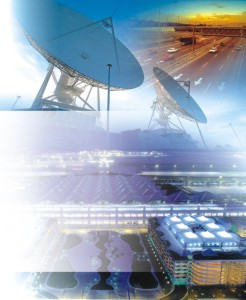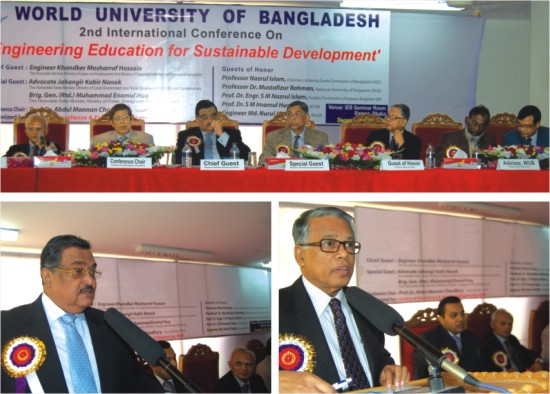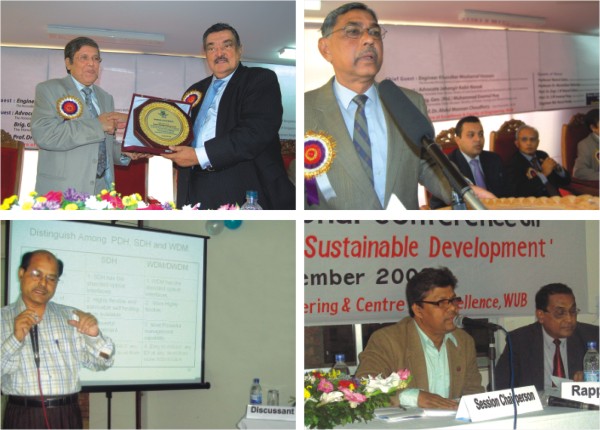|  Spotlight Spotlight
Focus on Engineering Education
Muntakim M. Choudhury
Technology improves the lifestyle of the individuals in a society and assists in the development of the economic activities of a nation. The technology adopted in different parts of the world largely depends on climate conditions, existing landscape, culture and various traditions and practices of the people of the land.
In recent times, the demand for survival from the devastating effects of changes in climate has raised concerns for different nations. Considering these challenges, the world has met in Copenhagen to discuss the means of tackling these problems. When the summit of high profile individuals from different nations was taking place in the cold weather of Europe, back in Dhaka some academics from home and abroad met together to exchange ideas and knowledge focused on using engineering and technology for sustainable development.
The conference was organized by the Faculty of Engineering of the World University of Bangladesh (WUB) and the Centre for Excellence. It was a two-day conference with its inauguration in the Institute of Engineers of Dhaka city. Around 500 participants from countries like India, Pakistan, Korea, Iran, Japan, Singapore, and UK were present in the conference to share their experience of research findings. A total of 66 papers were presented covering the areas of electrical and electronics engineering, mechatronics engineering, ICT, structural and civil engineering, architecture, and textile engineering.
In the opening speech, the chief guest of the session, Engineer Khandker Mosharraf Hossain, Minister for Labour and Employment and Minister for Expatriate's Welfare and Overseas Employment, emphasized the utility of such technologies. Explaining his experience in the development of roads and highways both in Bangladesh and in Africa, Engineer Khandker Mosharraf Hossain stated that the indigenous technologies must be taken into consideration for feasibility of every project. He also noted that fundamental research must not replace the major role of applied knowledge creation in implementing such expensive endeavours.
The Special Guest of the Conference State Minister for Power, Energy and Mineral Resources, Brigadier General (retd.) Muhammad Enamul Huq reiterated that engineers are the managers of development activities and as such they should be groomed with not only technical but also social and conceptual skills. He also emphasized that the proceedings of the conference could provide insightful guidelines to different bodies of the government.
Among other distinguished speakers were Professor Nazrul Islam, Chairman of the UGC, Professor Dr. Mustafizur Rahman of the National University of Singapore (NUS), Professor Dr. Nurul Islam, Vice-Chancellor of the Mowlana Bhashani Science & Technology University, Tangail, the advisor of the University, Dr. Musfiq M. Choudhury and the Chair of the session, educationist and Vice-Chancellor of WUB, Professor Dr. Abdul Mannan Choudhury.

Dr. Choudhury said that the University has been providing utilitarian education and have been the pioneer in engineering programs for diploma engineers. Although expensive in nature, the Vice-Chancellor stated that with WUB aims at producing a workforce equipped for the challenges of the 21st century. Chairman of the UGC emphasised that engineering education in the private sector is necessary and WUB will achieve excellence in the education arena in a few years time. Professor Dr. Mustafizur Rahman noted that social and economic development should be considered in line with the advancement of technology. Dr. Musfiq M. Choudhury emphasized that research as an integral part of knowledge creation and such conferences being places for networking, knowledge sharing, and further collaborations, should be part and parcel of knowledge dissemination.
The Papers in the Conference
A total of 66 papers were produced in the conference. The ICT session ran for two days and was aimed to improve the ICT sector in line with the present government’s vision of 2021. Most topics for discourse were issues relating to biometric passport readable technology and its impact on security. Security issues were also reiterated in discussions on e-commerce.
In the field of mechatronics, a lucrative paper was presented on electronic waste management for Dhaka city. Additionally, there were also discussions on topics relating to comparison of diesel engine and compressed natural gas in energy generation. In the field of electrical and electronics as well as civil and architecture, a paper on nucleonic control system and its application in Bangladesh caught the attention of the participants. The participants also presented papers on sustainable architectural design, improvements in slag blended concrete in underwater environment, and a number of them concentrated on concrete and its comprehensive strength.
Outcomes of the Conference
The World University of Bangladesh (WUB) aims to hold the next conference in February 2011 marking the month of the Language Movement. The upcoming conference will concentrate on engineering education for the enhancement of green technology. The conference secretary, Dr. M. Shafiqul Islam, dreams to have around 300 papers for presentation in the next conference and acknowledged the support of the sponsors of the ICEESD 2009. The best papers of this conference will be published in the new International Journal for Science, which will be the first online journal in Bangladesh. However, the abstracts of all the sixty six papers have already been published.

|

